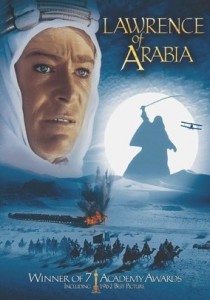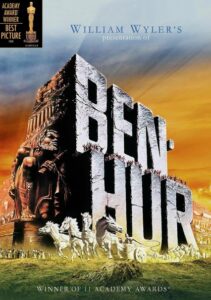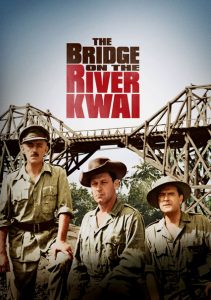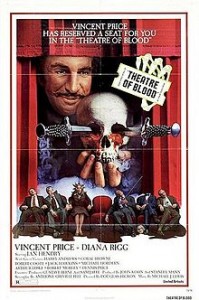Lawrence of Arabia-1962
Director David Lean
Starring Peter O’Toole, Alec Guinness, Omar Sharif
Top 250 Films #139
Scott’s Review #355
Reviewed January 9, 2016
Grade: A
Lawrence of Arabia (1962) is quite a grand film that must be seen on a large screen. This will ensure full appreciation of the enormous scale of the production.
Numerous shots of objects in the distance are featured, and the small screen dulls the experience.
An excellent film from top to bottom and groundbreaking at the time, due to the scope and vast proportions of the production, Lawrence of Arabia achieves its place in cinematic history.
It’s a treat to revisit from time to time.
The film is divided into two parts with an intermission, as with epics that last nearly four hours.
Peter O’Toole stars as T.E. Lawrence, a bored British Army Lieutenant who talks his way into a transfer to the Arabian desert.
As the film opens, it is 1935, and Lawrence has just been killed in a motorcycle accident. While this concept of revealing the ending and working backward is common in current films, it was novel in 1962 when the film was made.
While in Arabia, Lawrence successfully bonded bitter rival tribes to unite against Turkish oppression during World War I. He meets two young guides and other central characters there: Prince Faisal (Alec Guinness) and Sherif Ali (Omar Sharif).
Much of the film features the battles between the rival tribes and Lawrence’s struggle to achieve peace.
Many location sequences of Lawrence and company traveling miles and miles of hot desert are featured.
Some complain that Lawrence of Arabia is too slow-moving a film, but that is its selling point. I find the scenes of the group languishing across the desert incredibly lush and rich in meaning.
The intense heat and beating sun are fantastic in their cinematic grandeur. The film is meant to take its time—precisely what an experience in the Arabian desert would be like—and the mountainous dunes and swirling winds are brilliantly filmed.
David Lean is the king of the sprawling epic, and Lawrence of Arabia is his crowning achievement.
Lawrence is a well-written, layered, and complex character. He is not easy to describe or understand, which is also to the film’s credit.
The sheer weight loss that O’Toole underwent over the two years it took to film Lawrence of Arabia is impressive enough, but he was also a tortured soul emotionally.
The epic film Lawrence of Arabia (1962) requires a half-day of dedicated viewing, but it is worth every minute.
For a reminder of what an actual, breathtaking film looks like sans the oversaturated CGI and quick edits, one should take a deep breath and appreciate this work of art for its majestic look.
Oscar Nominations: 7 wins-Best Picture (won), Best Director-David Lean (won), Best Actor-Peter O’Toole, Best Supporting Actor-Omar Sharif, Best Screenplay Based on Material from Another Medium, Best Music Score-Substantially Original (won), Best Sound (won), Best Art Direction, Color (won), Best Cinematography, Color (won), Best Film Editing (won)



